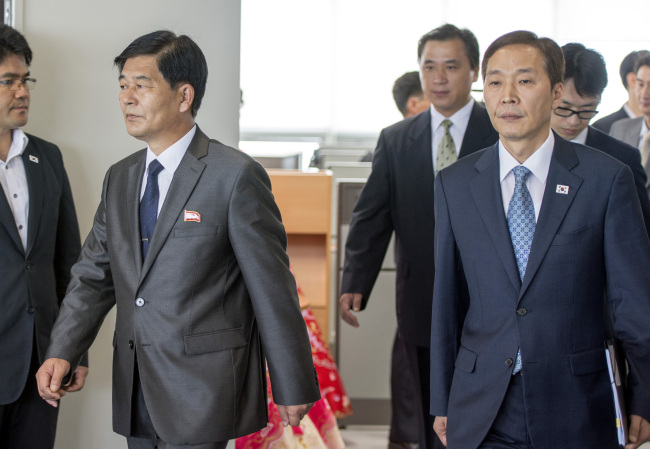
GAESEONG – Inter-Korean talks to reopen a joint industrial zone in Gaeseong appeared on the brink of collapse Thursday as the two sides threatened grave actions after failing to agree on the key issue of how to prevent future suspension.
After the sixth round of talks in the North Korean border city, the Pyongyang chief delegate declared that the talks are heading toward a breakdown due to the South’s insincere attitude and unilateral demands.
“If the Gaeseong industrial district cooperation project with the South collapses, our military will reoccupy the area,” Park Chol-su told South Korean reporters.
The North had relocated its military from the area near the border before the industrial zone opened in 2004.
The two sides ended the meeting without scheduling a follow-up.
South Korea expressed regret about the North’s “de facto declaration of the breakdown” and warned of a grave action if the North did not change its stance.
“As a result of today’s talks, the fate of the Gaeseong industrial complex is at a crossroads,” Unification Ministry spokesman Kim Hyung-suk said.
“If the North does not show a sincere attitude toward the measures to prevent a recurrence of (the district‘s suspension), we will have no choice but to make a grave decision,” he said.
With a slew of political and military events drawing near, the outlook of the idle factory zone and future cross-border relations appear bleak.
The two Koreas are separately planning for large-scale commemorations of the 60th anniversary of the 1950-53 Korean War and the armistice on Saturday.
Seoul and Washington are also slated to stage their annual weeklong joint military drills called Ulji Freedom Guardian in mid-August, which Pyongyang has called “provocative” and “war games for aggression.”
After Thursday‘s talks ended without results, the North Korean delegates abruptly entered the South Korean press room and distributed the draft copies of all the proposals they had made. A minor scuffle erupted as South Korean officials tried to block him.
The North said that Seoul had demanded that the North admit its sole responsibility for the closure and promise not to suspend the complex in the future.
The North initially rejected Seoul’s demand but made a concession by proposing the agreement contain the two sides’ joint commitment to preventing its closure, he said.
Park charged that Seoul showed no flexibility and stuck to its original demand.
The North also appears to have accepted Seoul’s demands to globalize the factory park, protect South Koreans’ safety and assets, and ensure easy passage, communications and customs.
It argued that the safeguards against a relapse must be devised “jointly by the two Koreas,” calling for a speedy normalization with no preconditions.
In its final draft, the North inserted a statement that “the South guarantees that it will not pose impure political words and military threats targeting the industrial district, and unless such problems are raised, the North guarantees that it will not take such steps as an entry ban and pullout of workers.”
But Seoul insisted on Pyongyang solely taking the responsibility for the current situation and providing “institutional assurances.”
“We accepted part of the North’s demands and the North did so. … The two sides have made substantial progress on institutional improvement, but the assurances issue remained the biggest sticking point,” Kim Ki-woong, the South’s chief negotiator, told reporters after the meeting. Kim is director-general of inter-Korean cooperation district support at the Unification Ministry.
“The North has been consistently making condemning and intimidating remarks throughout the negotiation process that it cannot make any unilateral promise or guarantee against another unilateral closure and that such a demand will make it impossible to restart the complex.”
Unification Ministry spokesperson Kim said the South proposed setting up the next meeting date because the discussions could not progress anymore with the North’s newly presented statement.
“But North Korea called our offer a ‘breakdown’ of talks, saying that it can discuss the meeting schedule through the Panmunjeom communication channel if we relinquish our position and agree to joint safeguards.”
As their last session soured and ended in 10 minutes, Kim’s counterpart Park unexpectedly rushed down nine floors to the press room together with about 20 other officials, saying the talks were “on the verge of collapse.”
Park, who serves as vice director of the General Bureau of the Special Zone Development Guidance, then began an impromptu media briefing, distributing multiple statements containing keynote remarks he made during the negotiations and three different sets of draft agreements he proposed to the South.
“At the fourth meeting, our delegation clearly declared that if the South side continues to display unjust claims and an insincere attitude we would cancel talks, consider it a dishonest act designed to intentionally ruin the tackling of the problem, and make the whole thing public,” he said.
The Unification Ministry expressed regret over the North Korean delegation’s “forceful intrusion” into the press room.
By Shin Hyon-hee and Joint Press Corps (heeshin@heraldcorp.com)
-
Articles by Korea Herald







![[Hello India] Hyundai Motor vows to boost 'clean mobility' in India](http://res.heraldm.com/phpwas/restmb_idxmake.php?idx=644&simg=/content/image/2024/04/25/20240425050672_0.jpg&u=)











